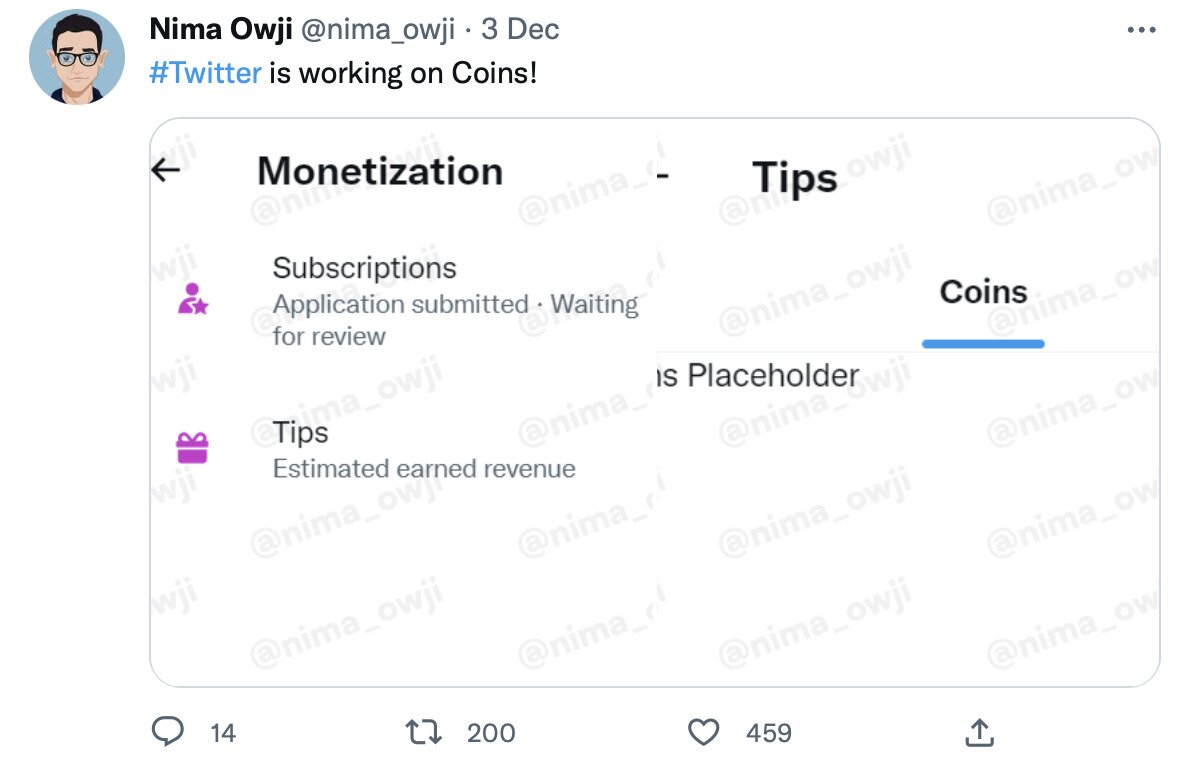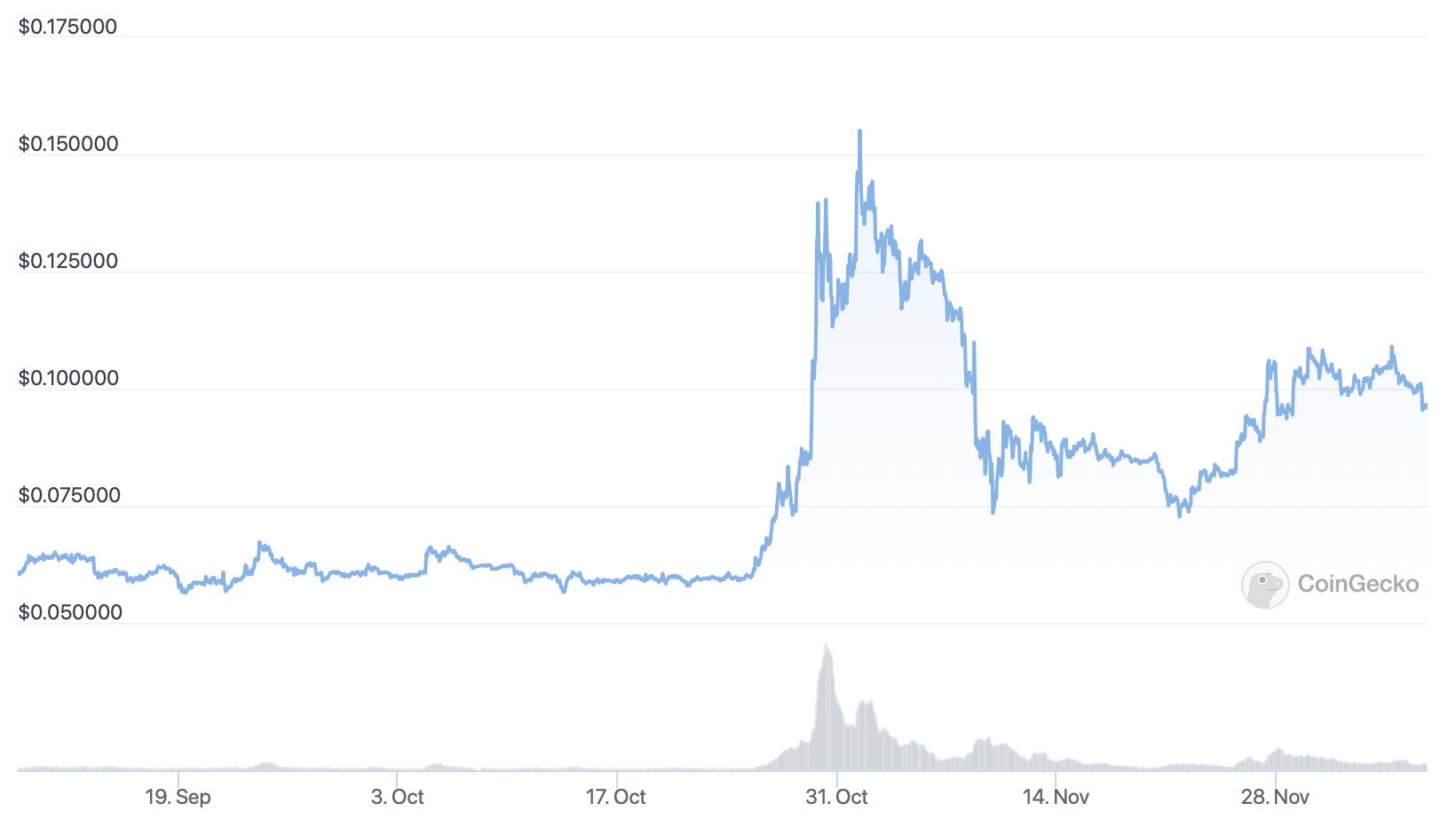- >News
- >A ‘Twitter Coin’ Would Crash Dogecoin, But It’s Not Going to Happen
A ‘Twitter Coin’ Would Crash Dogecoin, But It’s Not Going to Happen
Twitter is planning to launch its own native cryptocurrency, according to images leaked online. While these images in themselves don’t offer much detail, they nonetheless make credible speculation that a so-called ‘Twitter Coin’ is in the works, one which could be part of the ‘Payments’ features Elon Musk discussed during a company presentation at the end of November.
Twitter’s association with cryptocurrency has been extensively documented in the past year, given that new owner Elon Musk has been a Dogecoin champion (and also owner of ethereum and bitcoin) for some time now. However, most observers had assumed that Musk’s support for crypto would extend only so far as some kind of integration by Twitter of payments in existing cryptocurrencies, especially DOGE. But now, with reports of a Twitter Coin doing the rounds, DOGE has fallen by 4.5% in a day and by 6% in a week, more than any other top-20 cryptocurrency.
Does a Twitter Coin ultimately mean irrelevance for dogecoin? Assuming that a native Twitter token does become a reality, this could certainly end up being the case, although such a token could help increase cryptocurrency adoption overall. That said, as the example of Facebook and its doomed Libra/Diem currency makes clear, just because Twitter is planning to launch its own token doesn’t mean it will become a reality.
Twitter Coin: How Strong is the Evidence?
At this point, it should be made clear that the evidence for a Twitter Coin is not conclusive. That’s because it currently amounts to some leaked screenshots, from two noted leakers of tech industry info.
The first screenshots came from Nima Owji, who tweeted a test page for some monetization features on Twitter, including a section for “Coins.” This may seem innocuous in itself, but Owji also tweeted an apparently official mockup of the icon for the putative Twitter Coin.
Source: Twitter
This same mockup was also tweeted by fellow tech leaker and researcher Jane Manchun Wong, who had claimed to have extracted code from a version of Twitter’s app that contained the image. Interestingly, Wong’s tweet and Twitter account disappeared for a time after the post, and while it is now back online, its momentary disappearance fuelled (incorrect) speculation that it had something to do with her reporting on a potential Twitter currency.
Source: Twitter
These two leaked images are the extent of the evidence that Twitter may be working on its own native coin. Of course, the fact that the social network is definitely working on some kind of cryptocurrency payments feature also supports such a claim.
However, a “Coins” section within the Tips feature, as well as a picture of a coin with the Twitter logo in it, can be given more than one interpretation. Rather than indicating that a native Twitter token is in the works, the Coins section could merely end up being the place where existing cryptocurrencies (such as bitcoin, ethereum, dogecoin, etc.) are accessed. Likewise, the token image may simply be an icon representing Twitter’s integration with crypto, rather than its own digital currency.
What Would Happen to Dogecoin, and Crypto?
On the other hand, assuming that a Twitter Coin will become a reality soon, it would have a number of highly significant effects on the cryptocurrency market and industry.
For one, it would likely damage dogecoin’s price. That’s because, ever since Musk completed his proposed $44 billion acquisition of Twitter in late October, DOGE has been riding high, all because it’s assumed the social network will now introduce payments in DOGE. But if Twitter had its own coin, it wouldn’t need DOGE, so the latter would be deprived of the biggest hope it had for attracting significant adoption.
The price of dogecoin over the past 90 days. Musk’s Twitter takeover was confirmed at the end of October. Source: CoinGecko
You might also argue the same thing about crypto in general, yet it’s likelier that a Twitter Coin would be good for crypto as a whole. Assuming that the social network’s more than 200 million users begin using Twitter Coin, it would potentially familiarize them with the basics of cryptocurrency, encouraging them to explore further.
This kind of view has already been expressed by such figures as Cardano founder Charles Hoskinson, who said during the Web Summit 2022 conference in November that “Elon buying Twitter is probably going to bring crypto to 200 million people there. He has every intention of some form of crypto integration.”
The thing is, if Twitter were to get its users into crypto via its own token, it’s more likely they would turn to bigger, more fundamentally valuable cryptocurrencies such as bitcoin and ethereum, rather than to Dogecoin.
In rebuttal, one simple point is worth making though, which is that Twitter could launch its own Twitter Coin and also integrate payments in various cryptocurrencies, including dogecoin. So a native Twitter currency needn’t be a death knell for DOGE.
Why Twitter Coin May Never Happen
Another more positive argument for dogecoin holders is that Twitter Coin may never even get started, since the failure of Facebook’s Libra/Diem stablecoin shows that regulators will not take the prospect of a Twitter cryptocurrency lightly.
Indeed, the consensus seems to be that regulatory pushback was the major reason why Diem failed, with regulators and lawmakers from around the world expressing serious concerns over Facebook’s ability to adequately address issues related to money laundering, consumer protection and various other financial risks. Exactly the same thing would apply to Twitter if it were to launch its own currency and enable people to use it independently of existing financial institutions and intermediaries.
Indeed, given Elon Musk’s sketchy track record with regulators (e.g. his $40 million fraud settlement) and the US government (e.g. its ongoing scrutiny of the Twitter takeover), he would be at least as big a target for officials as Mark Zuckerberg and Facebook (now Meta), if not more of a target.
As such, the mere possibility of a native Twitter cryptocurrency does not mean we’ll see one anytime soon. Musk has been promising fully autonomous self-driving on Tesla cars since at least 2015 (if not longer), for instance, yet Tesla drivers are still waiting patiently for such a feature. For this reason, the cryptocurrency market and industry shouldn’t be pinning all of its hopes on the mercurial Twitter owner, and should instead focus on building stuff people actually want to use.





